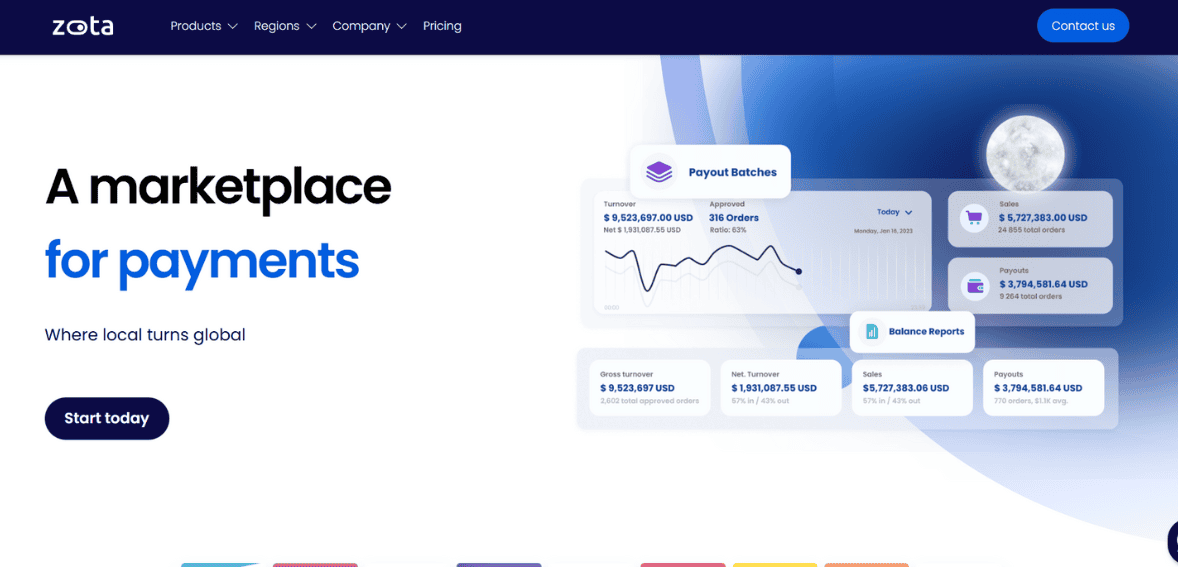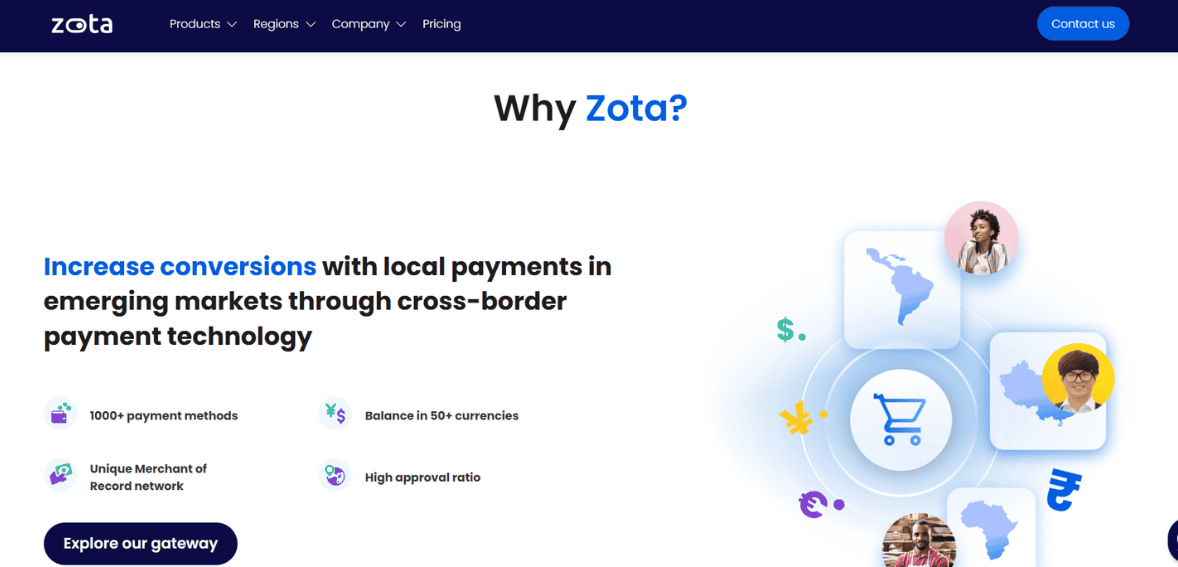
Zotapay Review
- 03rd Oct, 2025
- | By Linda Mae
- | Reviews
Zotapay is a payment gateway and global financial services provider that has built a reputation for enabling businesses to handle online transactions across multiple markets. As commerce continues to expand beyond borders, the demand for reliable and compliant payment solutions has grown significantly. Zotapay positions itself as a bridge between merchants and customers worldwide by supporting a wide range of currencies, payment methods, and industries. Lets read more about Zotapay Review.
The company has carved out its space by offering a combination of technology, compliance, and financial expertise. Its services are designed for businesses that require more than just basic card processing, particularly those operating in sectors with complex regulatory environments or cross-border trade. Zotapay emphasizes not only flexibility in transactions but also compliance with regional requirements, which is a growing necessity in the payment landscape.
Table of Contents
ToggleCompany Background and Market Position | Zotapay Review
Founded as part of the growing wave of fintech providers, Zotapay focuses on giving merchants access to emerging markets where traditional payment processors may not always operate. The company has established its presence by collaborating with local payment providers, banks, and regulators. This localized approach allows it to serve industries that might otherwise struggle to find reliable payment solutions.
Zotapay is headquartered in multiple regions to maintain a global footprint, which reflects its mission of being more than a regional gateway. Its service model is built around industries that require flexible yet compliant solutions, including e-commerce, digital services, travel, and in some cases, higher-risk sectors.
In terms of market positioning, Zotapay differentiates itself by prioritizing global reach and tailored solutions rather than focusing on small-scale merchants alone. Unlike more mainstream providers that primarily serve low-risk businesses, Zotapay appeals to merchants who operate in industries with higher levels of regulation or geographic complexity. This positioning makes it a strategic choice for businesses that need custom solutions rather than generic one-size-fits-all offerings.
Its growth has been supported by partnerships with acquiring banks and regional financial institutions. While it may not have the same brand recognition as larger processors, it has established credibility within its niche by being reliable in markets where many other providers are absent.
Core Payment Processing Features
At its core, Zotapay offers the functionality merchants need to accept payments securely and efficiently. It supports a wide range of currencies and provides global acquiring services, ensuring that businesses can transact in local markets while still consolidating their revenues. This multi-currency capability is particularly important for companies targeting international audiences.
The platform provides card processing, bank transfers, and alternative payment methods, which makes it versatile. Merchants can accept payments through major credit cards as well as localized solutions that are often critical in regions like Asia, Latin America, and Africa. Zotapay aims to give businesses the ability to scale globally without being restricted by the limitations of a single payment method.
Additional features include fraud protection tools, transaction monitoring, and reporting systems. These are designed to help merchants not only accept payments but also manage risk effectively. The payment infrastructure supports recurring billing and subscription models, which are essential for businesses in digital services and SaaS.
Overall, Zotapay’s payment processing suite covers the essentials expected from a modern payment provider while layering on the flexibility needed for international trade. The focus on providing a wide range of options gives merchants access to tools that can improve conversion rates and reduce friction in the checkout process.
Integration and API Capabilities
For any payment solution, ease of integration is crucial. Zotapay offers API-driven integration that allows developers to connect payment functionality to websites, applications, and platforms. The APIs are designed to be flexible, enabling merchants to tailor the payment flow to their specific needs rather than being forced into a rigid structure.
The company provides documentation to guide integration, covering everything from transaction requests to callbacks and reporting. For e-commerce businesses, Zotapay also supports plugins and extensions for popular platforms, which reduces the burden of manual setup. However, compared to more mainstream gateways, the availability of pre-built plugins may not be as extensive, potentially requiring additional developer input.
One strength of Zotapay’s integration is its adaptability for industries with complex needs. For instance, businesses that require multi-step verification, dynamic currency conversion, or localized payment flows can leverage the APIs for customization. This flexibility ensures that merchants can create a checkout experience that aligns with their customers’ expectations.
While integration is generally straightforward, businesses without in-house technical teams may find the process requires some outside assistance. This is not unusual in the payments industry, but it does highlight that Zotapay caters more to businesses seeking custom solutions than to small merchants looking for a simple plug-and-play service.

Security and Compliance Standards
Security is a cornerstone of payment processing, and Zotapay adheres to recognized global standards. The platform is PCI DSS compliant, ensuring that sensitive cardholder data is handled securely. Merchants can take confidence in knowing that the gateway meets industry requirements designed to reduce the risk of breaches and fraud.
Beyond PCI compliance, Zotapay implements advanced fraud detection tools and real-time monitoring to identify suspicious activity. The platform includes features such as transaction risk scoring, velocity checks, and geolocation filters. These are particularly important for businesses that operate in high-risk sectors or across regions with elevated fraud rates.
Another key aspect of Zotapay’s operations is its compliance with Anti-Money Laundering (AML) and Know Your Customer (KYC) requirements. By conducting due diligence on both merchants and customers, Zotapay helps ensure that transactions are legitimate and reduces the likelihood of regulatory issues.
For merchants, this strong compliance framework can be both an advantage and a challenge. While it provides added security and credibility, it also means that onboarding may be more rigorous compared to lightweight payment gateways. Businesses must be prepared to provide documentation and undergo verification before being fully onboarded.
User Experience and Merchant Dashboard
The merchant dashboard is designed to give businesses control and visibility over their transactions. Zotapay’s dashboard provides real-time reporting, transaction tracking, and settlement overviews. This is valuable for businesses managing high volumes of international payments, where transparency is essential.
The interface allows merchants to filter transactions by date, region, or payment type, which makes it easier to analyze customer behavior. Exportable reports provide actionable insights for accounting and reconciliation, saving businesses time in financial management.
Customization is another feature of the dashboard. Merchants can configure settings such as payout preferences, notifications, and fraud rules according to their requirements. This level of flexibility is useful for businesses operating in diverse regions with varying levels of customer expectations.
That said, the user experience may not be as streamlined as mainstream gateways targeting small merchants. Zotapay prioritizes functionality and detail, which can come at the expense of simplicity. For businesses with dedicated finance teams, this is a positive, but for small merchants, the learning curve may feel steeper.
Overall, the dashboard aligns with Zotapay’s focus on professional-grade tools rather than entry-level simplicity.
Supported Payment Methods
Zotapay supports an extensive range of payment methods, which is one of its strongest advantages. Merchants can process credit and debit card payments from major providers, but the company goes beyond that by enabling local payment options in emerging markets.
For example, in regions where card penetration is low, bank transfers, cash-based vouchers, or mobile wallets are often the preferred payment method. Zotapay’s partnerships with local providers allow merchants to tap into these options, improving conversion rates among customers who might otherwise abandon a transaction.
E-wallets and alternative payments are also supported, reflecting the global trend toward more flexible payment solutions. For businesses in digital services, this range of options can be the difference between a completed sale and a lost opportunity.
By enabling multiple methods, Zotapay ensures that businesses are not limited to one type of customer demographic. This inclusivity makes the platform appealing for international merchants, particularly those targeting regions with diverse financial habits.
The breadth of supported methods strengthens Zotapay’s positioning as a global payment provider rather than one limited to a few geographies or card networks.
Settlement and Payout Processes
Timely payouts are a critical factor in choosing a payment provider. Zotapay offers settlement services that allow businesses to receive funds in multiple currencies, depending on their operational needs. Settlement cycles vary based on region, bank partnerships, and risk profile, but they generally align with industry standards.
The platform supports global banking connections, which makes it easier for merchants to consolidate revenues across borders. Payouts can be directed to designated accounts, giving businesses flexibility in managing their cash flow.
For high-risk industries, settlement times may be longer due to increased compliance checks. This is standard practice in the payments industry but is important for merchants to be aware of when projecting revenue timelines.
Zotapay emphasizes transparency in settlements by providing detailed breakdowns within the merchant dashboard. This ensures that businesses can reconcile payments with invoices and customer transactions more easily.
While settlement speed is generally acceptable, smaller businesses accustomed to instant or next-day payouts from mainstream providers may find the timelines less competitive. However, for international businesses dealing with complex transactions, Zotapay’s payout processes are designed to prioritize reliability and regulatory compliance over speed.
Pricing and Fee Structure
Zotapay’s pricing model is not fully standardized, as it depends on the type of business, industry risk, and geographic focus. Fees generally include transaction charges, currency conversion costs, and in some cases, additional service fees depending on the level of customization required.
Unlike some mainstream providers that publicly publish flat-rate fees, Zotapay tends to negotiate pricing with merchants. This allows flexibility for larger businesses but can be less transparent for smaller ones seeking upfront clarity.
The advantage of this model is that high-volume merchants or businesses with specialized needs may secure tailored rates that align with their operations. However, businesses must carefully review their agreements to ensure they understand all costs, including potential hidden charges such as cross-border fees or chargeback handling costs.
Overall, Zotapay’s pricing is competitive within its niche but may appear less straightforward compared to mainstream payment processors. Businesses that value tailored solutions over simplicity may find the trade-off acceptable.

Customer Support and Service Quality
Customer support is a vital component of any payment service. Zotapay provides support through multiple channels, including email, phone, and dedicated account managers for higher-tier clients. The availability of account managers is a significant benefit for businesses with complex needs, as it allows for personalized assistance.
Response times are generally reported as satisfactory, particularly for urgent issues. Support teams are knowledgeable about both technical and compliance matters, which helps merchants navigate not only integration challenges but also regulatory concerns.
However, smaller businesses that are used to 24/7 chat-based support from mainstream providers may find the model less accessible. Zotapay’s approach leans more toward dedicated service for established businesses rather than round-the-clock coverage for entry-level merchants.
Overall, the quality of support reflects Zotapay’s focus on professional-grade service. While it may not cater to every type of business equally, those that require guidance in complex environments often find the level of support reassuring.
Pros of Using Zotapay
Zotapay’s strengths lie primarily in its flexibility and global coverage. Merchants gain access to multiple payment methods, currencies, and regions that are often underserved by other providers. This inclusivity helps businesses expand into new markets with confidence.
The platform’s compliance and security measures add another layer of value, ensuring that transactions are not only processed but also safeguarded against fraud and regulatory issues. Its tailored solutions and API flexibility allow businesses to create payment experiences that fit their unique requirements.
Additionally, the availability of dedicated support for larger clients makes it a reliable partner for businesses operating in high-risk or complex industries.
Cons and Limitations of Zotapay
Despite its strengths, Zotapay is not without limitations. Its pricing transparency is less clear than some mainstream processors, which may be a drawback for smaller merchants seeking straightforward fee structures.
Integration, while flexible, may require technical expertise that not all businesses have in-house. This can increase the reliance on external developers or technical teams.
Settlement speeds, particularly for high-risk industries, may also lag behind faster mainstream providers. Additionally, the company’s brand recognition is not as widespread as major competitors, which may influence the perception of smaller merchants looking for established household names.
These limitations do not necessarily outweigh its strengths but highlight that Zotapay is best suited for specific business types rather than a universal solution.
Ideal Business Types for Zotapay
Zotapay is particularly well-suited for businesses operating in international markets, especially those entering regions where local payment options are critical. E-commerce, digital services, online travel, and subscription-based industries can benefit from its global coverage.
High-risk businesses, such as those in industries often underserved by mainstream processors, may also find Zotapay to be a viable option due to its compliance-first approach. Its willingness to serve these industries makes it stand out compared to many competitors that avoid such markets.
Smaller merchants with straightforward payment needs may not find it as suitable, given its pricing model and technical requirements. For those businesses, mainstream processors with plug-and-play services may be more cost-effective.
Comparison with Competitors
When compared to mainstream gateways like Stripe or PayPal, Zotapay stands out in its support for high-risk and international merchants. These larger providers often avoid complex industries or limit coverage in certain regions, while Zotapay actively caters to them.
On the other hand, competitors may offer clearer pricing, faster payouts, and more extensive pre-built integrations. This means that businesses seeking simplicity and speed may lean toward mainstream providers.
Zotapay competes more directly with specialized processors that focus on cross-border or high-risk payments. In this niche, it offers a compelling balance of compliance, security, and flexibility. Its differentiation lies in its willingness to tailor solutions and adapt to unique merchant needs.
Conclusion and Final Thoughts
Zotapay is a payment gateway designed for businesses that need more than just standard card processing. Its strengths lie in its ability to serve international merchants, support multiple payment methods, and provide compliance-driven services. For businesses in complex or high-risk industries, Zotapay offers access to markets and solutions that are often hard to find.
At the same time, it is not a one-size-fits-all solution. Smaller merchants or those seeking transparency and simplicity may find mainstream alternatives more suitable. Zotapay’s model is best for businesses willing to invest in tailored services and navigate a more involved onboarding process.
Ultimately, Zotapay fills an important gap in the payment processing landscape, serving merchants who value global reach, flexibility, and security over simplicity and brand recognition.
FAQs
Q1. Is Zotapay safe for handling international payments?
Yes, Zotapay is PCI DSS compliant and employs fraud detection, AML, and KYC checks. It provides a secure environment for global transactions.
Q2. What types of businesses can benefit most from Zotapay?
It is ideal for e-commerce, digital services, travel, subscription-based businesses, and high-risk industries that need tailored solutions and international coverage.
Q3. How does Zotapay’s pricing compare to other providers?
Pricing is competitive within its niche but less transparent than mainstream providers. Fees are customized, which can benefit larger businesses but may feel unclear to smaller ones.
